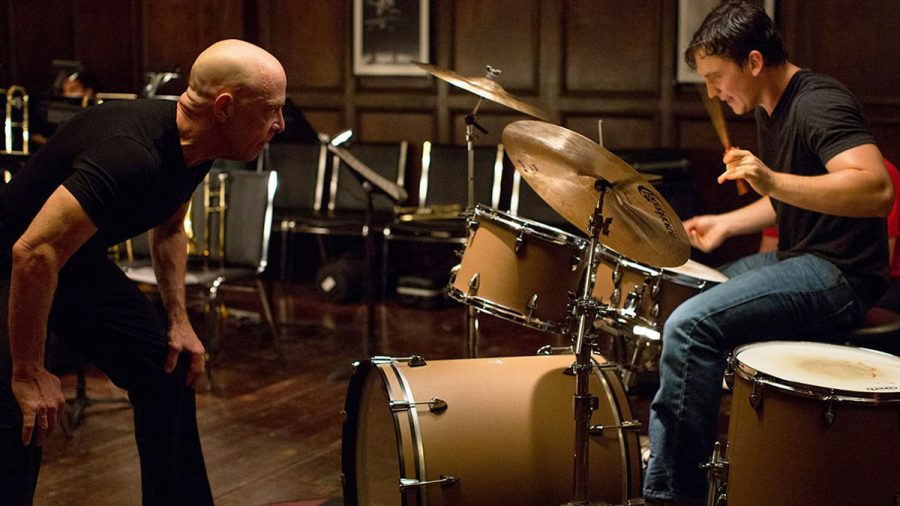The cost of following one’s dreams
Film “Whiplash”, playing in Woodland Theater Sept. 16-18, follows a naive drummer throughout his harsh schooling
More stories from Lara Bockenstedt
Photo by Submitted
A still from the film capturing Teller’s character as he furiously tries to impress his instructor (Simmons).
Three drummers sit around one drumset, their professor screaming expletives at them as they take turns contesting to match a killer tempo. Their hair is plastered to their foreheads in clumps of sweat as drops of blood dance atop cymbals.
For the boy who finally matches the tempo and his instructor, jazz music is life or death. This contrast is found throughout the film “Whiplash” coming to Woodland Theater Sept. 16-18.
Andrew (Miles Teller) is a student drummer whose opposite is Fletcher (J.K. Simmons), Andrew’s ruthless professor at Shaffer Conservatory of Music. Simmons eventually won an Oscar for best actor in a supporting role, beating out Ethan Hawke in “Boyhood” a twelve year project and highly acclaimed film.
Writer-director Damien Chazelle based “Whiplash” off of his own experiences trying to make it in a jazz school as a percussionist with an abrasive instructor perpetually standing over his shoulder.
The film opens to a black screen with a steadily increasing drumbeat. When it reaches its apex, a long hall appears with Andrew at the end, wildly soloing. He begins studying at what is supposedly the best music school in the country. As he navigates being a naive new kid, Fletcher invites him into the top band, exploiting his eagerness.
To Andrew, earnest to become the next Great, this abusive instructor becomes his compass for success.
What makes Fletcher trustworthy are his sporadic moments of humanity; he encourages a little girl to pursue music and sheds tears for a dead former student. Andrew turns to him for inspiration. This is when the movie becomes difficult to watch as Fletcher slaps, throws chairs at and emotionally berates Andrew.
Chazelle, a gifted film editor, uses contrast to his advantage. The rehearsal room contains warm tones of yellow lights and dark wooden paneling. It appears to be the one authentic and vibrant place.
In the outdoor world, flat, natural lighting keys the viewer into the importance of Andrew’s father and girlfriend. They become peripheral distractions as he continually retreats to a practice room of harsh lighting.
Even the sounds, from hard-to-hear whispers to blaring jazz, show how easily pride wells and collapses, dependent upon Fletcher’s tone of voice.
The whiplash of this movie goes beyond Fletcher’s snides: it lies within a blood-pumping unpredictability. The editing style heightens anticipation with lengths of time spent showing students on the cusp of beginning a song. Likewise, Andrew seems constantly within inches of greatness and impressing his professor.
“Whiplash” was shot and edited within ten weeks. Only 19 of these days were spent on set. Matching the frenzied storyline, it is said that during the intense drumming scenes, Chazelle refused to tell Teller when they had stopped filming a shot.
The film’s music misses a few beats and it’s jazz isn’t the best; the “greats” Andrew idolizes aren’t widely considered the best jazz percussionists in history. However, the final five-minute drum solo hooked me, leaving me wondering what the collateral relationship would be between Andrew and Fletcher.
“Whiplash” is a narrative of a young man willing to shed visceral, uncomfortable blood, sweat and tears in order to find his musical greatness, which surely must be hidden somewhere within him. Ultimately, he spirals down a rabbit-hole with glaring tunnel vision.
You hope that everything will go well for this young dreamer. There’s no chance of it until he and Fletcher reach a climactic point of understanding. In that moment, it becomes clear that their emotions, their lives, were only secondary characters to the unattainable Perfect Solo.
Any viewer can see how unhealthy Andrew’s obsession is. However, they can also recognize something of their ardent dream-chasing selves within him.
The movie will be playing Friday at 7 p.m., as well as Saturday and Sunday at 2 p.m. and 7 p.m..

